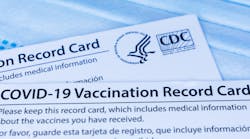Private businesses in the U.S. that employ more than 100 employees will soon have to ensure their workers are fully-vaccinated or tested weekly for COVID-19.
That’s the top item in a sweeping directive issued by President Biden on Thursday, September 9, which aims to increase COVID vaccinations, keep schools open and mitigate any resurgence of the pandemic. The mandate for businesses with more than 100 employees will affect more than 80 million workers across the country.
According to the White House, the mandate will come in the form of an emergency temporary standard, or ETS, by the Department of Labor’s Occupational Safety and Health Administration. Employers will also be required to give their workers time off in order to get vaccinated.
The White House didn’t say when the rule will go into effect. Keith Wilkes, a labor and employment partner at national law firm Hall Estill, predicts it won’t take long, based on its resemblance to an earlier order for government workers.
“Although the timing of when the ETS requirement will go into effect is not clear, it will likely not be a long wait. The federal government did its legal homework before implementing the same mandate, via executive order, for federal employees in July,” Wilkes wrote in an email.
Affected business owners now need to work out if they can reasonably accommodate employees who cite sincerely held religious belief or a disability-based reason, Wilkes explained: “Absent falling into one of those two categories, unvaccinated private sector employees who fall under this new rule will have no choice but to obtain full vaccination if they wish to keep their current job.”
Thursday’s order strengthened the July directive for federal workers by directly mandating they receive a vaccine, removing the regular-testing option for those without a medical or religious exemption. It similarly requires vaccinations without an option to get tested regularly instead for more than 17 million medical-care workers at facilities receiving funds from Medicare and Medicaid.
In remarks at the White House, Biden blamed those who have not received COVID vaccinations for endangering others.
In addition to the vaccine mandates, the Thursday orders included a few measures meant to bolster small businesses during a shaky economic recovery. According to the White House, the Small Business Administration will quadruple its maximum loan amount from $500,000 to $2 million, make it easier for multiple-location businesses like hotels to apply, and streamline the process for Payroll Protection Program loan forgiveness.
Alongside the executive orders’ impact on private employers, Biden asked—but could not order—state governments to require vaccinations for state employees, including teachers. Nine states, Puerto Rico, and Washington, D.C. already have vaccine requirements for K-12 teachers. He also asked venues like movie theaters and concert halls to require guests show proof of vaccination or a negative test in order to enter.
“This is a pandemic of the unvaccinated,” Biden said. “The unvaccinated overcrowd our hospitals, are overrunning the emergency rooms and intensive care units, leaving no room for someone with a heart attack, or pancreatitis, or cancer.”
He stressed that leading scientists have confirmed the vaccines provide strong protection against severe coronavirus, and he pointed out a vaccine has received full approval from the Food and Drug Administration. (Comirnaty, the COVID vaccine produced by Pfizer and BioNTech, received full FDA approval in August for patients 16 and older. Full approval for other vaccines is still pending.)
In a statement released the same day as Biden’s announcement, National Association of Manufacturers Jay Timmons said increasing vaccinations would save lives as well as the economy, but stopped short of explicitly praising the mandate.
“Americans can be grateful to President Trump for ‘Operation Warp Speed,’ [which] enabled the United States to develop the lifesaving vaccines against COVID-19, and to President Biden for his continued focus on getting Americans vaccinated,” said Timmons.
He added that the vaccines are safe, effective, and “made for us, by people like us—manufacturers in America.”
Timmons said he and his organization “look forward to working with the administration” to keep vaccine requirements from interfering with manufacturer operations. “It is important that undue compliance costs do not burden manufacturers, large and small alike,” he said.
